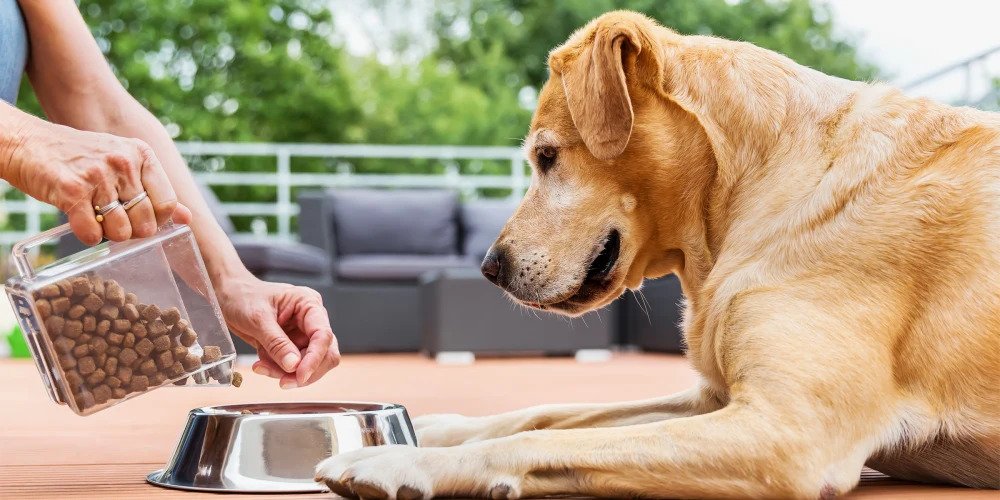Table of Contents
ToggleThe Best Food for Senior Pets: Supporting Your Aging Pet’s Health
Like people, our pets’ nutritional requirements alter as they age. Senior pets require certain nutritional considerations to preserve their health and vitality in their golden years, just as people need various nutrients to sustain their aging bodies. You’ve come to the correct spot if you’re a devoted pet owner searching for the best senior pet food. The best senior-formulated pet foods that address the particular requirements of elderly dogs and cats will be examined in this guide.
We’ll go over the advantages of these foods, point out what to look for in a senior pet diet, and recommend some of the best brands that can significantly improve your pet’s health.
Let’s begin!

Identifying Senior Pets’ Changing Nutritional Needs
Pets’ bodies undergo a number of changes as they become older, which might impact their nutritional needs. Although what constitutes a “senior” pet varies by breed and size, cats and small dogs are typically regarded as seniors at 7–10 years old, although larger dog breeds may be regarded as seniors as early as 5-7 years old.
Here are some common aging issues that senior pet food can address:
Joint Health: As pets age, joint pain and arthritis become more common. Glucosamine and chondroitin are essential nutrients that can help maintain joint flexibility and reduce pain.
Digestive Health: Older pets often experience a decline in digestive efficiency. Fiber and probiotics are crucial for promoting healthy digestion.
Weight Management: Aging pets are prone to weight gain due to reduced activity levels. Senior pet foods often have fewer calories to prevent obesity.
Immune Support: Antioxidants like vitamin E and C can help strengthen your pet’s immune system, which may weaken with age.
Cognitive Function: Just like humans, pets can suffer from cognitive decline. Ingredients like DHA (an omega-3 fatty acid) are known to support brain health.
Heart Health: Taurine and omega-3 fatty acids are important for maintaining a healthy heart, particularly in senior dogs and cats.
Key Ingredients to Look for in Senior Pet Foods
When shopping for food for your senior pet, look for the following key ingredients that are tailored to their specific health needs:
High-Quality Protein: Lean proteins like chicken, fish, and turkey are ideal for maintaining muscle mass without adding extra fat.
Healthy Fats: Omega-3 and omega-6 fatty acids can help support healthy skin, coat, and joint function.
Glucosamine & Chondroitin: These are critical for joint support and can alleviate arthritis pain.
Probiotics & Prebiotics: To aid digestion and enhance nutrient absorption.
Antioxidants: Vitamins C and E, as well as beta-carotene, can help boost immune health and protect against cellular damage.
Fiber: Essential for promoting digestive health and preventing constipation.
Top Senior-Formulated Pet Foods to Support Your Aging Pet’s Health
Here’s a roundup of some of the best senior pet food options available on the market. These brands are known for their high-quality ingredients and have been formulated to support the health of senior pets.
1. Hill’s Science Diet Senior Dog Food
Why We Recommend It: Hill’s Science Diet is renowned for its veterinarian-recommended formulas. Their senior dog food is specifically designed to support joint health, weight management, and heart function in older dogs. It includes natural ingredients like chicken meal, barley, and brown rice, along with omega-6 fatty acids and vitamin E for a healthy coat.
Key Benefits:
- Contains high-quality protein for lean muscle.
- Fortified with omega-3 fatty acids and antioxidants.
- Includes glucosamine and chondroitin for joint support.
2. Blue Buffalo Life Protection Formula Senior Dog Food
Why We Recommend It: Blue Buffalo uses real meat as the first ingredient, along with wholesome whole grains, garden veggies, and fruit. The LifeSource Bits in their senior formula include a blend of antioxidants, vitamins, and minerals that support immune system health.
Key Benefits:
- Packed with protein from deboned chicken.
- Rich in omega-3 and 6 fatty acids for joint health and a shiny coat.
- Contains glucosamine for joint support.
3. Royal Canin Aging 12+ Senior Wet Cat Food
Why We Recommend It: For aging cats, Royal Canin’s wet cat food provides an easily digestible formula with thin slices in gravy. It includes specific nutrients that support kidney health and maintain vitality in senior cats.
Key Benefits:
- Supports healthy aging with controlled phosphorus levels.
- Easy to chew and digest, perfect for older cats.
- Contains EPA and DHA for joint health.
4. Nutro Ultra Senior Dog Food
Why We Recommend It: Nutro Ultra is known as the “Superfood Plate” for dogs, combining lean proteins with antioxidant-rich vegetables and fruits. This senior formula helps older dogs maintain optimal health and wellness.
Key Benefits:
- Blend of 15 vibrant superfoods including chia, kale, and coconut.
- Glucosamine and chondroitin for joint support.
- Non-GMO ingredients and no artificial flavors or preservatives.
5. Wellness Complete Health Senior Cat Food
Why We Recommend It: Wellness Complete Health focuses on promoting whole-body health for senior cats. It’s formulated with controlled sodium levels, added fiber, and vitamins that support kidney and urinary tract health.
Key Benefits:
- High-quality protein from deboned chicken.
- Added taurine for heart and vision health.
- Probiotics to support healthy digestion.
Homemade Diets for Senior Pets: A DIY Approach
If you’re more inclined to prepare meals for your pets at home, there are some great options that you can easily whip up in your kitchen. Homemade diets allow you to have full control over the ingredients, which is great for pets with allergies or sensitivities.
Senior Dog Recipe: Chicken & Rice with Vegetables
- Ingredients:
- 1 cup of cooked brown rice
- 1 cup of diced chicken breast
- 1/2 cup of chopped carrots
- 1/2 cup of green beans
- 1 tablespoon of olive oil
- Instructions:
- Cook chicken thoroughly and dice it into bite-sized pieces.
- Steam or boil the vegetables until tender.
- Mix the chicken, rice, and vegetables together with a tablespoon of olive oil.
- Allow to cool before serving.
Senior Cat Recipe: Fish & Sweet Potato Delight
- Ingredients:
- 1 cup of cooked salmon or white fish
- 1/4 cup of mashed sweet potato
- 1 tablespoon of flaxseed oil
- Instructions:
- Cook the fish thoroughly, removing any bones.
- Mash the sweet potato and mix with the fish and flaxseed oil.
- Let it cool before serving to your feline friend.
Supplements for Senior Pets: Boosting Their Diets
In addition to choosing the best senior pet food, you may want to consider adding supplements to your pet’s diet. Supplements can provide additional support for joint health, cognitive function, and overall well-being.
Top Recommended Supplements for Senior Pets
Glucosamine and Chondroitin:
- Supports joint health and reduces inflammation.
- Great for pets showing signs of arthritis or stiffness.
Probiotics:
- Improves digestive health by promoting healthy gut bacteria.
- Helps prevent diarrhea and gastrointestinal issues.
Fish Oil (Omega-3 Fatty Acids):
- Enhances skin and coat health.
- Supports cognitive function and reduces inflammation.
Antioxidants:
- Vitamins like C and E help fight free radicals.
- Boosts immune function and supports overall health.
CBD Oil:
- Can relieve pain, reduce anxiety, and improve mobility.
- Popular for older pets with arthritis or cognitive decline.
Transitioning Your Pet to Senior Food: Tips for a Smooth Change
Switching your pet’s diet can be challenging, especially if they’re accustomed to a certain type of food. Here are some tips to make the transition as smooth as possible:
Gradual Change: Mix the new food with your pet’s current food, gradually increasing the proportion of the new food over 7-10 days.
Monitor Their Health: Keep an eye on your pet’s stool, energy levels, and coat condition during the transition period.
Hydration: Ensure your pet is drinking enough water, especially if transitioning to a dry kibble diet.
Consult Your Veterinarian: Always check with your vet before making any major changes to your pet’s diet, especially if they have underlying health issues.
Final Thoughts: Prioritizing Your Senior Pet’s Health with the Right Nutrition
Our pets bring joy, comfort, and companionship into our lives, and it’s only fair that we take care of them as they age. Choosing the right food for your senior pet can enhance their quality of life, reduce the risk of chronic diseases, and ensure they remain happy and healthy well into their golden years.
Whether you opt for a premium senior pet food brand or choose to prepare homemade meals, always prioritize ingredients that support joint health, cognitive function, and overall well-being. Consider supplementing their diet with joint-supportive nutrients like glucosamine and antioxidants to further boost their health.
By investing in high-quality nutrition, you’re not just feeding your pet—you’re ensuring that their twilight years are filled with vitality and joy.
Remember to check out the links provided above for the best deals on top-rated senior pet foods that will keep your beloved pet feeling their best!
FAQs
When should I switch my pet to senior food?
Most pets should switch to senior food around age 7, but it depends on the breed. Larger dogs may need senior food earlier.Can I feed my senior pet regular adult food?
While adult food may suffice, senior formulas are designed with additional nutrients that cater to aging needs.What should I do if my senior pet refuses to eat new food?
Try mixing in some of their favorite treats or gradually introduce the new food with their old one to encourage them.
I hope this guide helps you make the best choices for your senior pets!
